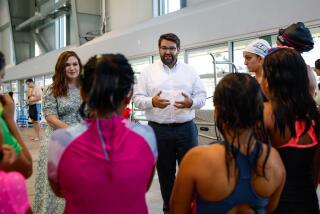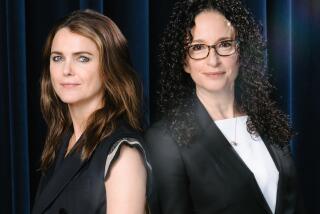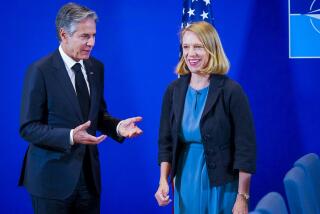New Lessons for a New World of Diplomacy : The State Department shows off its training center in Virginia. The unveiling also heralds a shift in focus.
- Share via
WASHINGTON — To admiring State Department officials, a new $61-million training academy for diplomats and other aides headed for overseas posts is much more than a striking sprawl of bricks and glass in a woodsy Virginia suburb.
The school, they say, is “a metaphor” for wide-ranging curriculum changes being made to support new diplomatic priorities in a world without a Cold War.
Preventing war is still high on the training agenda, but there is new emphasis on boosting U.S. exports and on tackling such global issues as the environment, refugees, crime and arms control.
“We aim not to simply put old wine in a new bottle,” said Lawrence P. Taylor, director of the new National Foreign Affairs Training Center, which used to be called the Foreign Service Institute when it occupied a couple of cramped, rented high-rises. “We want to move to greater excellence and relevance in helping to modernize our foreign affairs posture.”
At a dedication ceremony this month, Secretary of State Warren Christopher noted that the Arlington, Va., facility will train 15,000 students annually in 250 classrooms and 600 rooms in all. Students will come from 47 government agencies and choose from 300 courses, including 63 languages. There is a gym, a pool and a 100-child day-care building.
“As far as I can tell,” Christopher said wryly, “the center will have everything but a football team.”
Besides adding courses and retooling old ones, the academy will attempt some large training leaps with computers. For example, students learning French can pick their way through a story on the computer with 15 different outcomes. Presumably, that will inspire them to try harder and enjoy it more, officials said.
More dramatically, the academy is establishing electronic links with U.S. diplomatic posts abroad so that workers there--including foreign nationals--can polish language skills and take other training through interactive video.
If a woman in Bangkok knew she was going to be transferred to Beijing, she could study Chinese and be given some background on Chinese politics and culture, all by computer hookup from the training center, officials said.
In another major innovation, the academy is beginning to teach different styles of leadership “appropriate to various personalities and locations in the international environment,” Taylor said. “For example, leadership by negotiation or leadership by persuasion. The traditional form of vertical-command leadership is not the only or best form.”
The new academy, a series of graceful buildings strung together on 72 acres about four miles from State Department headquarters in Foggy Bottom, will do many of the things it has done in the past but with vastly improved facilities, said John T. Sprott, the deputy director.
On a recent tour, Sprott took a visitor straight to jail--that is, a mock jail cell with iron bars, not the cardboard ones at the former training site. The jail is used to teach diplomats how to deal with Americans who have been incarcerated, “sometimes in grubby, difficult environments,” Sprott said.
The next stop: a room where the visa application process is simulated. Students training to be consular officials stand behind five windows as long, noisy lines of “applicants” speak broken English and, sometimes, make impossible demands.
The academy also includes areas for students to plug in laptop computers for homework, a large auditorium where simultaneous translation is available in two languages, and a curving, spacious cafeteria where diners pick up a flag representing the language they are learning to speak and take it to a table where other diners are flying their flag.
Below ground, “classified rooms” immune to electronic eavesdropping by foreign governments are used to discuss how to deal with touchy issues--such as preventing American-made movies from being shown abroad without compensation.
Above ground, elegant drawing rooms with fireplaces help budding diplomats go over the fine points of cocktail party-giving.
“This is not just a place,” Sprott beamed. “It is a grand learning environment.”
More to Read
Sign up for Essential California
The most important California stories and recommendations in your inbox every morning.
You may occasionally receive promotional content from the Los Angeles Times.













